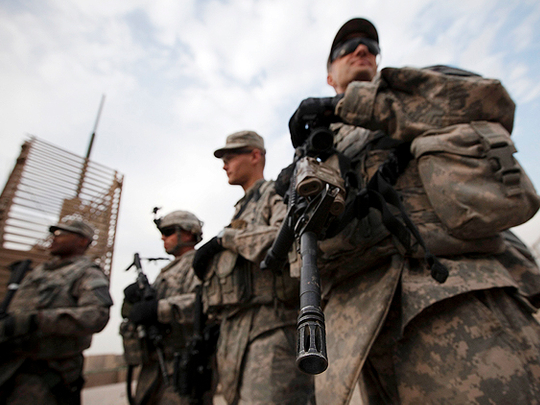
Baghdad: Iraq’s ruling alliance and powerful Shiite militias have urged Prime Minister Haider Al Abadi to request Russian air strikes on Daesh militants, who control large parts of the country, members of the coalition and militias said.
Growing pressure on Al Abadi to seek Russian support puts him in the delicate position of trying to appease his ruling coalition, as well as militias seen as a bulwark against Daesh, while keeping strategic ally Washington on his side.
America’s top general, Joseph Dunford, said on a trip to Baghdad on Tuesday that the United States won assurances from Iraq that it would not seek such strikes.
Dunford, on his first visit to Iraq since becoming chairman of the Joint Chiefs of Staff on October 1, said Al Abadi and Iraqi Defence Minister Khalid Al Obeidi both told him they were not seeking Russia’s help.
Shortly after leaving Baghdad, Dunford told reporters travelling with him that he had laid out a choice when he met with Abadi and Al Obeidi.
“I said it would make it very difficult for us to be able to provide the kind of support you need if the Russians were here conducting operations as well,” Dunford said. “We can’t conduct operations if the Russians were operating in Iraq right now.”
He said there was “angst” in the US when reports surfaced that Al Abadi had said he would welcome Russian air strikes in Iraq. The US, Dunford said, “can’t have a relationship right now with Russia in the context of Iraq”.
Former Cold War foes the United States and Russia are waging rival campaigns of air strikes in Syria. Speculation has grown that Russia could expand its campaign to Iraq, where Al Abadi and the Iranian-backed militias have expressed frustration with the pace and depth of the US campaign against Daesh.
Two members of parliament said the prime minister was under “tremendous pressure” from the ruling National Alliance to request Russian intervention.
Iraq received over $20 billion in US military training since the fall of Saddam Hussain in 2003 but its army virtually collapsed when Daesh fighters swept through the north last year and made gains in the west.
US-led air strikes have failed to turn the tide in the war against the ultra-hardline militants who have declared a caliphate and want to redraw the map of the Middle East.
MPs and alliance members said an official request for Russian air strikes was relayed to Al Abadi last week and that he has not officially responded.
“Al Abadi told the meeting parties that it wasn’t the right time to include the Russians in the fight because that would only complicate the situation with the Americans and could have undesired consequences even on long-term future relations with America,” said a senior politician close to Al Abadi.
Al Abadi’s spokesman said he has not discussed air strikes with Russia. At the same time he was “not ruling out any side that could provide support to Iraq,” Saad Al Hadithi said.
During his visit, Dunford pledged to seek new ways to build momentum against Daesh and challenged descriptions of the conflict as a stalemate, after an advance which secured most of the strategic Baiji oil refinery.
Russia, Iran, Syria and Iraq have formed a Baghdad-based intelligence cell to boost efforts to counter Daesh. The cell has already shared intelligence for air strikes in Iraq and Syria.
Karim Al Nouri, a Badr Brigade spokesman, said an Iranian member of the intelligence-sharing cell had helped in the Baiji refinery operation. That account was confirmed by an official from the Asaib Ahl Al Haq militia.
The US-led coalition said in a statement it had conducted more than 130 air strikes to support operations around Baiji since August 1 and said its relationship with Iraq “is as strong as ever”.
Muen Al Kadhimi, a senior aide to the leader of the Badr Brigade militia, said Russia had proven more decisive in its air campaign in Syria than the Americans so it was only natural to seek Moscow’s help in Iraq.












